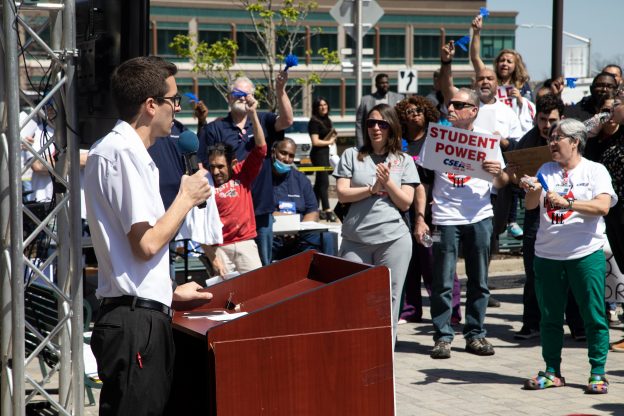
Five unions representing various workers of Stony Brook University held a protest outside the University Hospital parking garage on Wednesday, April 12 in opposition to a newly proposed parking plan for the fall semester.
Lasting about an hour and a half, the protest echoed previous demonstrations, the last of which was held two weeks ago. Before that, students had also organized a small protest shortly after Stony Brook announced the parking changes.
Despite a large union presence, there was little representation from the undergraduate student body, one of the groups that will be most affected by the proposed parking changes.
The demonstration contained representation from the Public Employees Federation (PEF), United University Professions (UUP), the Clean Energy States Alliance (CESA), the SBU Graduate Student Employees Union (GSEU) and the SBU Research Assistants Union.
“We think this is a standard way for the administration to squeeze more money out of us,” Doğa Öner, the chief steward of GSEU said. “[Especially with] our poverty wages, which we find completely unacceptable. We’re already getting paid way below the poverty level.”
Some union leaders interviewed by The Statesman said that Stony Brook had violated their union contracts by presenting the plan as settled without the opportunity for negotiation.
In chapter 19 of the 2019-2023 contract between the PEF and New York State (NYS), it is stated that “The State and PEF shall, upon the demand of either party, negotiate concerning the imposition of fees for parking by employees in this unit or the modification of current employee parking fees in any parking facility.”
Because Stony Brook is a state institution, it is subject to this contract.
The contract between the State University of New York (SUNY) and the UUP contains a similar agreement, stating that “the status quo will be maintained for parking facilities presently provided without charge and no existing charge for parking facilities shall be increased or decreased without negotiations in pursuant to this Article.”
Both contracts are expired. However, the articles about parking will continue to be in effect in their current form until new contracts are ratified with NYS and SUNY, respectively.
“We were called into a meeting, we were presented this plan, and then it was published to the public about an hour after our meeting,” said Andrew Solar-Greco, president of the Stony Brook chapter of UUP. “And that is not bargaining in good faith at all, that is acting as if this plan is a given rather than subject to negotiations.”
Nora Higgins, the NYS PEF nurse coordinator, said that the University eroded trust between itself and campus unions over time, citing construction projects on campus that did not use union workers as an example.
In 2018, Stony Brook announced that it was planning the construction of a new residential community named the “campus village” that would have added a bed capacity of 1,680 to be used by both undergraduate and graduate students. To develop the dormitories, they partnered with private companies Gilbane Development Company and Provident Resources Group rather than using union labor.

The current status of the campus village is unknown. Higgins also mentioned that private employees had been brought onto campus to do several dormitory improvement projects, pointing out that a public institution should not be using non-unionized labor for construction and improvement projects.
Solar-Greco also mentioned that an increase in parking costs could see a higher rate of staff turnover — something Stony Brook is already struggling with.
“We have recruitment and retention issues already on [West Campus], starting salaries for a lot of positions are just not competitive and they are going to now add this to the mix,” Solar-Greco said. “And then the person is going to start and then they’re gonna say wait, I have to pay for parking. I got another offer from this place. And then our members have to work twice as hard because they’re picking up the slack for vacant positions. It’s already happening.”
Andrew Dobbyn, the statewide president of GESU, said that the cost of parking would hurt employees who already are not being paid a high enough wage to live in the area.
“I mean, at the end of the day, our members don’t make a ton of money,” Dobbyn said. “We’re fighting tooth and nail every day of the week to increase base pay so that people can afford to live here. We have handled the majority of teaching and research on this campus, and now they want to turn around and charge us a few percentage points of our paycheck to come to work.”
Solar-Greco also said that while the administration likes to compare Stony Brook to fellow universities in the Association of American Universities (AAU), most of the schools in that group are more prestigious than Stony Brook and are located in more urban areas. He also mentioned that because Stony Brook’s flagship status is a big talking point for the administration, they should look at fellow flagship University at Buffalo’s parking model, which charges $15 per year for parking on its campus. Buffalo does not charge students any extra cost to park on campus, as it is already built into the transportation fee that all students attending pay.
Other SUNY schools do not operate their parking services using a tiered system similar to what Stony Brook has laid out in its plans for the fall. Binghamton University charges $140.55 per year for a parking permit for students and $475 per year — including a $25 registration fee — for faculty. However, with the exception of the registration fee, all union members have this cost waived.
According to Stony Brook’s website, “Capital and operational costs for parking have far outpaced the revenues generated for years, which means we have been operating with a substantial deficit. Also negatively impacting the financial situation is that permit parking rates for University garages and Hospital facilities have not increased in over 30 years.”
Dobbyn also pointed out that, from his perspective, the commuter premium parking plan Stony Brook put into place last year was a failure, as he explained that most of the time he rarely sees more than a few cars in every premium lot.
Laura Coppola, a protest attendee and the assistant director of the Medical Staff Office at the Stony Brook University Hospital, said that she was under the impression that parking costs would stop entirely after the garage had been paid off.
“I’ve been working here for over 30 years,” Coppola said. “And when I first started here, it was indicated to me that once the parking garage was paid off, we wouldn’t have to pay parking at all. I don’t have an issue with paying some increased parking, but to increase it [this much] is ridiculous. We are state employees. We don’t get paid as much as the private sector.”











